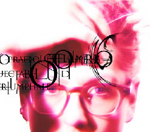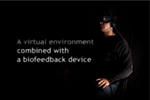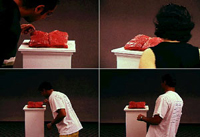Difference between revisions of "Main Page"
| Line 13: | Line 13: | ||
Projects in the BioMedia Lab emphasize the role that aesthetics, design, and representation play in our broad understanding of biotechnology, biomedicine, and related fields. Many projects involve collaboration with SFU colleagues and students in computer science, biomedical engineering, bioinformatics, electrical engineering, and architecture. | Projects in the BioMedia Lab emphasize the role that aesthetics, design, and representation play in our broad understanding of biotechnology, biomedicine, and related fields. Many projects involve collaboration with SFU colleagues and students in computer science, biomedical engineering, bioinformatics, electrical engineering, and architecture. | ||
| − | |||
| Line 24: | Line 23: | ||
BioMorphic Typography is Gromala's term for a family of fonts that respond, in real-time, to a user's changing physical states, as measured by a biofeedback device. Rather than one typeface, it is a postmodern pastiche of many different fonts that are continually morphing. So, for example, the font "throbs" as the user's/writer's heart beats, expands as the user breathes, and "spikes" according to galvanic skin response. In this way, users become aware of their autonomic states -- physiological states that usually remain under our conscious awareness. This project is part of a larger initiative, Design for the Senses. The goal is to develop new approaches to experiential design that focus on the senses and the phenomenological history of the body. | BioMorphic Typography is Gromala's term for a family of fonts that respond, in real-time, to a user's changing physical states, as measured by a biofeedback device. Rather than one typeface, it is a postmodern pastiche of many different fonts that are continually morphing. So, for example, the font "throbs" as the user's/writer's heart beats, expands as the user breathes, and "spikes" according to galvanic skin response. In this way, users become aware of their autonomic states -- physiological states that usually remain under our conscious awareness. This project is part of a larger initiative, Design for the Senses. The goal is to develop new approaches to experiential design that focus on the senses and the phenomenological history of the body. | ||
| − | |||
| Line 50: | Line 48: | ||
A project that provokes users' senses of their visceral responses. A time-based (that is, decaying) slab of meat, constructed as a book, is embedded with various sensors that cause the meat to react and quiver as the viewer approaches it. The reanimated flesh also responds with other movements and sound when users touch it. The next stage of development includes artificial intelligence and explores notions of generative art. | A project that provokes users' senses of their visceral responses. A time-based (that is, decaying) slab of meat, constructed as a book, is embedded with various sensors that cause the meat to react and quiver as the viewer approaches it. The reanimated flesh also responds with other movements and sound when users touch it. The next stage of development includes artificial intelligence and explores notions of generative art. | ||
| + | |||
| + | ---- | ||
| + | |||
| + | |||
| + | '''NeuroFloat''' | ||
| − | - | + | [[Image:neurofloat.jpg]] |
| + | |||
| + | |||
| + | A project that provokes users' senses of their visceral responses. A time-based (that is, decaying) slab of meat, constructed as a book, is embedded with various sensors that cause the meat to react and quiver as the viewer approaches it. The reanimated flesh also responds with other movements and sound when users touch it. The next stage of development includes artificial intelligence and explores notions of generative art. | ||
Revision as of 06:27, 19 December 2007
BioMedia Lab
School of Interactive Arts and Technology(SIAT), Simon Fraser University
Professor: Diane Gromala (Assoc. Director, SIAT)
The BioMedia Lab is dedicated to creatively exploring the relationships among art, technology, and the biosciences.
Our interests range across disciplines: biomedical phenomenology, open source DNA, visceral forensics, genome hacking, affective biometrics, and biomolecular networking.
Projects in the BioMedia Lab emphasize the role that aesthetics, design, and representation play in our broad understanding of biotechnology, biomedicine, and related fields. Many projects involve collaboration with SFU colleagues and students in computer science, biomedical engineering, bioinformatics, electrical engineering, and architecture.
Biomorphic Type™
BioMorphic Typography is Gromala's term for a family of fonts that respond, in real-time, to a user's changing physical states, as measured by a biofeedback device. Rather than one typeface, it is a postmodern pastiche of many different fonts that are continually morphing. So, for example, the font "throbs" as the user's/writer's heart beats, expands as the user breathes, and "spikes" according to galvanic skin response. In this way, users become aware of their autonomic states -- physiological states that usually remain under our conscious awareness. This project is part of a larger initiative, Design for the Senses. The goal is to develop new approaches to experiential design that focus on the senses and the phenomenological history of the body.
Meditation Chamber
The Meditation Chamber is an immersive VR environment that provides users with real-time feedback. Wearing a head-mounted display and biofeedback device, users are guided through a series of relaxation and meditation techniques. In real-time, the audio and visuals are synced to the users' continually changing physiological states (respiration, pulse rate and sweat gland activity (a measure of calmness)). As users' approach meditative states, the hypnotic visuals dissolve to moving mist and darkness as the user relaxes. Exhibited at SIGGRAPH's Emerging Technologies, and seen on CNN.
MeatBook
A project that provokes users' senses of their visceral responses. A time-based (that is, decaying) slab of meat, constructed as a book, is embedded with various sensors that cause the meat to react and quiver as the viewer approaches it. The reanimated flesh also responds with other movements and sound when users touch it. The next stage of development includes artificial intelligence and explores notions of generative art.
NeuroFloat
A project that provokes users' senses of their visceral responses. A time-based (that is, decaying) slab of meat, constructed as a book, is embedded with various sensors that cause the meat to react and quiver as the viewer approaches it. The reanimated flesh also responds with other movements and sound when users touch it. The next stage of development includes artificial intelligence and explores notions of generative art.



